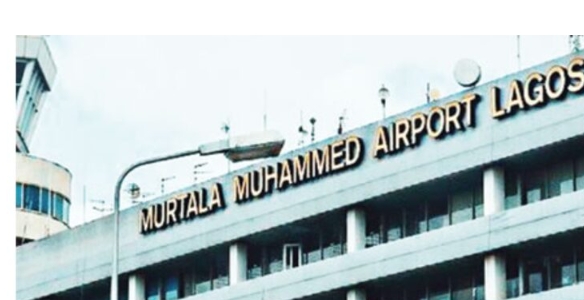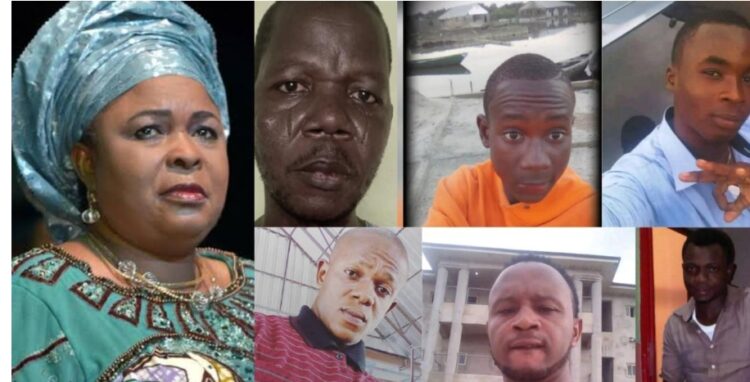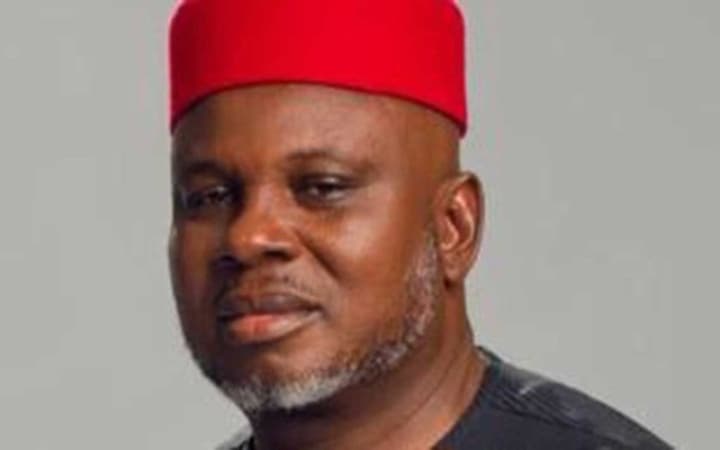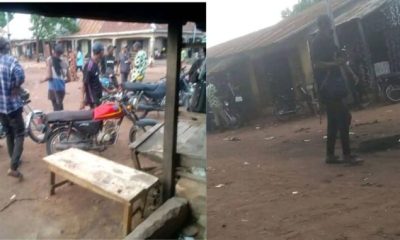News
FAAN buys multimillion naira machine to replace Customs checkpoint, touting

By Kayode Sanni-Arewa
War against touting, extortion, and unnecessary delay of passengers at Nigerian airports through multiple human checks, the Federal Airports Authority of Nigeria has commenced the procurement of machines to replace human checks of luggage, particularly at customs checkpoints.
FAAN made this known over the weekend, during a tour of the airport, where correspondents were shown the various newly installed machines.
The Director of Aviation Security at FAAN, Igbafe Afegbai, said the customs table where they physically check travellers’ barges will be dismantled in a week’s time.
Both industry stakeholders and travellers have, at different times, complained of the customs checking point/table within the Murtala International Airport Terminal. While stakeholders criticised the customs activities within the terminal, travellers also described it as an avenue for extortion.
Recently, Customs officers and the FAAN security chief, alongside other top officers at the authority, clashed with Customs officers at the airport over duty overlap.
This development forced the aviation workers to threaten a nationwide strike, an action scheduled for March 31, 2025.
The complaints and feedback from passengers may have forced FAAN to deploy the machines that are being installed at screening points at the Lagos International Airport to totally eliminate the manual search.
The machines, which include six pieces of Orion 927DX, a full-body scanner, and an itemiser bought by FAAN, have the capacity to exhibit images in the Classic 4-colour and the new proprietary Spectrum 4-colour options, providing a clear image, allowing improved security by quick and accurate identification of threats, and increasing throughput.
Afegbai stated that the machines are also designed to detect a wide range of explosives and narcotics in real-time during the scanning process by marking a potential threat on the X-ray image.
While speaking with journalists, Afegbai stressed that by the time FAAN finishes installing all the screening machines and the monitors, each security agent will have their own monitors, and the tables for physical human checks will be quashed.
“The tables you see will be a thing of history; you will not see any table here. There will be no physical contact because what we are also doing is that when we fix those monitors and the machines dictate unaccepted objects, the concerned officials will take the passenger and his or her luggage to designated areas for physical checks.
“The designated areas will also have CCTV cameras. This is to ensure the passengers are not being exploited. When the machines dictate something, the aviation securities call the relevant agencies, such as the National Drug Law Enforcement Agency, Customs, and quarantine, amongst others, to follow up.”
He further explained that FAAN will be extending the machines to include six different monitors for the six agencies present at the airport, for their officials to monitor the bags through the screens.
He added, “Customs will have their screen. The quarantine will have their screen, and others will also have theirs. So, everybody will sit down while luggage goes through the machines.”
He further explained, “Before we bought the new machines, our machines were not detecting some drugs, but with the new machines, we will start to train some of the security agencies, like the NDLEA, the DSS, the immigration, and the quarantine
Also corroborating the FAAN security chief, head of department, ICT at the airport, Chima Oge, said the new Orion 927DX machine has features that help with the identification of organic materials accurately and quickly, either in range mode, which highlights the areas based on the range selected by the operator, and/or in interactive mode, which provides the operator the option to display the areas based on the value of the pixel.
He also revealed that the machine could detect undeclared funds, drugs and other illicit materials.
News
Court Orders Fast-Tracked Trial Of 15 Workers Held In Prison For 6 Yrs Over Patience Jonathan’s Missing Jewellery

The Bayelsa State High Court has ordered a fast-tracked trial for 15 domestic workers who have spent nearly six years in detention at the Okaka Correctional Centre, Yenagoa, without conviction, over missing jewellery belonging to former First Lady Patience Jonathan.
SaharaReporters gathered that the order came after the prosecution and defence teams reached a rare consensus during Thursday’s proceedings to fast-track the case, which has suffered deliberate and serial delays allegedly masterminded by Patience Jonathan’s private legal team.
“The court proceeded well today, and both parties have agreed to finish the case as soon as possible, with an accelerated hearing. So victory is coming,” a source close to the defence told SaharaReporters.
The 15 accused persons, most of whom were part of Mrs Jonathan’s domestic staff, were arrested in 2019 and have remained in detention without bail, with the case dragging on endlessly for years amid reports of consistent manipulation of court processes.
A previous report by SaharaReporters exposed a pattern of intentional court delays reportedly orchestrated by Mrs Jonathan’s private prosecutors, Ige Asemudara and Samuel Chinedu Maduba, both of whom have been consistently representing the former First Lady since 2019.
“The prosecutors are Ige Asemudara and Samuel Chinedu Maduba,” one of the sources confirmed.
“One of them comes from Lagos while the second travels in from Port Harcourt. They’ve been handling this case from day one, presenting witnesses who come to tell lies. One witness took almost two years,” a source earlier told SaharaReporters.
Sources alleged that Mrs Jonathan gave direct instructions to delay the proceedings.
“The aim is to frustrate the process and keep these innocent people in prison as long as possible. It’s an abuse of the legal system,” a source close to the courtroom told SaharaReporters.
The delay tactics reportedly included health excuses, unreachable witnesses, and repeated adjournments based on flimsy reasons. “Sometimes, Ige Asemudara would claim he is sick or his witness has work. Other times, he just asks for long adjournments,” said another insider.
Shockingly, the judiciary itself was not spared from complicity allegations. A source revealed that the presiding judge initially delayed hearing the bail applications, claiming she wanted to listen to some of the prosecution’s evidence first to determine the nature of the charges.
“When the case started in 2019, they all applied for bail,” the source said. “But the judge told their lawyers to wait so she could hear some evidence. After that, she shockingly denied bail, saying the offences were capital and therefore not bailable.”
Meanwhile, the Bayelsa State High Court has denied any involvement in the delays, recently restating its commitment to speedy justice and dismissing reports of suspects’ trials being delayed.
The court, in a reaction to reports that alleged that the trial of 15 domestic workers facing trial for burglary and theft of jewellery, was being delayed, said the claim was false.
It claimed that, according to available records, the matter had suffered delays due to multiple defence lawyers who must cross-examine witnesses, which had slowed down proceedings. It added that the case had also suffered several adjournments at the instance of counsel.
The delays have left the defence team and families of the detainees stunned, particularly since the prosecution reportedly failed to produce any convincing evidence to support the capital charges.
The affected persons are Williams Alami, Vincent Olabiyi, Ebuka Cosmos, John Dashe, Tamunokuro Abaku, Sahabi Lima, Emmanuel Aginwa, Erema Deborah, Precious Kingsley, Tamunosiki Achese, Salomi Wareboka, Sunday Reginald, Boma Oba, Vivian Golden and Emeka Benson.
They have remained behind bars without justice, caught in the web of power, influence, and a compromised legal process.
With the court finally conceding to an accelerated hearing, hope has once again sparked for the victims of this legal nightmare.
News
Catholic Church gives Anambra APC guber candidate rigid conditions for support

Barely 10 days after he emerged as the All Progressives Congress (APC) gubernatorial standard bearer for the November 8 gubernatorial poll in Anambra State, Prince Nicholas Chukwujekwu Ukachukwu has been given rigid conditions to receive the support of the Catholic Church in the state.
Sources told The Guardian that the basic conditions set before the APC governorship candidate include the selection of a deputy from the Catholic fold, and also that 60 per cent of his cabinet must be Catholics.
This is just as the APC governorship hopeful has been inundated by lobbyists for the position of running mate, even as he engaged with concerned APC stakeholders in the state in a bid to find common ground with various women groups agitating for gender parity.
The Guardian learned that the race for Ukachukwu’s running mate had been narrowed down between two former female Senators, Dr. Uche Lilian Ekwunife and Dr. Margery Okadigbo, who hail from the Central and North Senatorial Districts of the state, respectively.
Although both female politicians are Catholics, the factor of zoning is said to be impacting their chances, because while the more politically active Ekwunife hails from the populous Anambra Central District, Mrs. Okadigbo is from Anambra North, which has just served out eight years of governorship through Willie Obiano.
Also, the fact of her maiden community, Igboukwu in Aguata Local Council, and influence as the current Director General of South East Governors’ Forum is ticking in Ekwunife’s favour, as her candidacy is expected to help slice the votes in Old Aguata Union from where the incumbent Governor Chukwuma Soludo hails. (The Guardian)
News
NJC investigates 18 Imo judges over suspected age falsification

The National Judicial Council has launched a probe into 18 judges in the Imo State judiciary over allegations of age falsification, in a development raising fresh concerns about integrity and transparency within Nigeria’s judicial system.
The NJC, in a statement on Thursday by its Deputy Director of Information, Kemi Ogedengbe, confirmed that the allegations were being treated with utmost seriousness and were currently under review.
“Allegations of this nature require detailed investigation before any action can be taken,” Ogedengbe stated.
“The NJC is investigating the allegations and may take a decision by the end of the month. For now, we cannot act without completing our inquiries. The council will convene and make decisions on the matter.”
The investigation follows a petition submitted by a civil society group, Civil Society Engagement Platform, which described the matter as an “unprecedented breach of judicial integrity.”
The group alleged that the judges deliberately manipulated their birth records to either prolong their tenure or gain appointments within the judiciary.
In a letter addressed to the NJC Chairman and Chief Justice of Nigeria, Justice Kudirat Kekere-Ekun, the platform cited discrepancies in the judges’ official documents, including Law School registration forms, Department of State Services reports, and Nominal Rolls.
The petition, signed by CSEP’s Director of Investigation, Comrade Ndubuisi Onyemaechi, included what it described as compelling documentary evidence marked as Exhibits 001 to 018.
Among those named in the petition is Justice I. O. Agugua, who reportedly has two different birth dates—May 10, 1959, and May 10, 1960—and is also facing separate allegations of misconduct.
Justice C. A. Ononeze-Madu is alleged to have birth records stating both July 7, 1963, and July 7, 1965, while Justice M. E. Nwagbaoso is accused of presenting conflicting dates of birth—August 20, 1952, and August 20, 1962.
The remaining 15 judges also reportedly have varying inconsistencies in their personal data, a revelation that has intensified public scrutiny of the judiciary’s accountability mechanisms.
The NJC, which is constitutionally empowered to discipline judicial officers, is expected to reconvene soon to deliberate on the findings of its inquiry and take appropriate disciplinary actions where necessary.
The unfolding development comes amid mounting calls for institutional reforms to restore public trust in the judiciary and reinforce ethical standards across all arms of government.
-

 News22 hours ago
News22 hours agoBREAKING: Unknown gunmen reportedly storm Senator Natasha’s family residence
-

 News16 hours ago
News16 hours agoAbuja light rail project must be commissioned on May 29-Wike vows
-

 News22 hours ago
News22 hours agoLawmaker Slams NBA Over Rivers Crisis, Demands Return of N300m
-

 News7 hours ago
News7 hours agoTinubu Remains Engaged In Governance From Europe, Will Return After Easter – Presidency
-

 News17 hours ago
News17 hours agoJust in: Alleged Herdsmen Armed With AK-47 Rifles Take Over Communities In Benue State
-

 News20 hours ago
News20 hours agoFinally , Lagos Court frees Quadri, young Nigerian who stood before Obi’s convoy in viral photo
-

 News17 hours ago
News17 hours agoSEYI Tinubu Speaks On Alleged Abduction, Brutalization Of NANS President Atiku Abubakar Isah
-

 Foreign7 hours ago
Foreign7 hours agoTrump To Close US Embassies In South Sudan, France, Others






